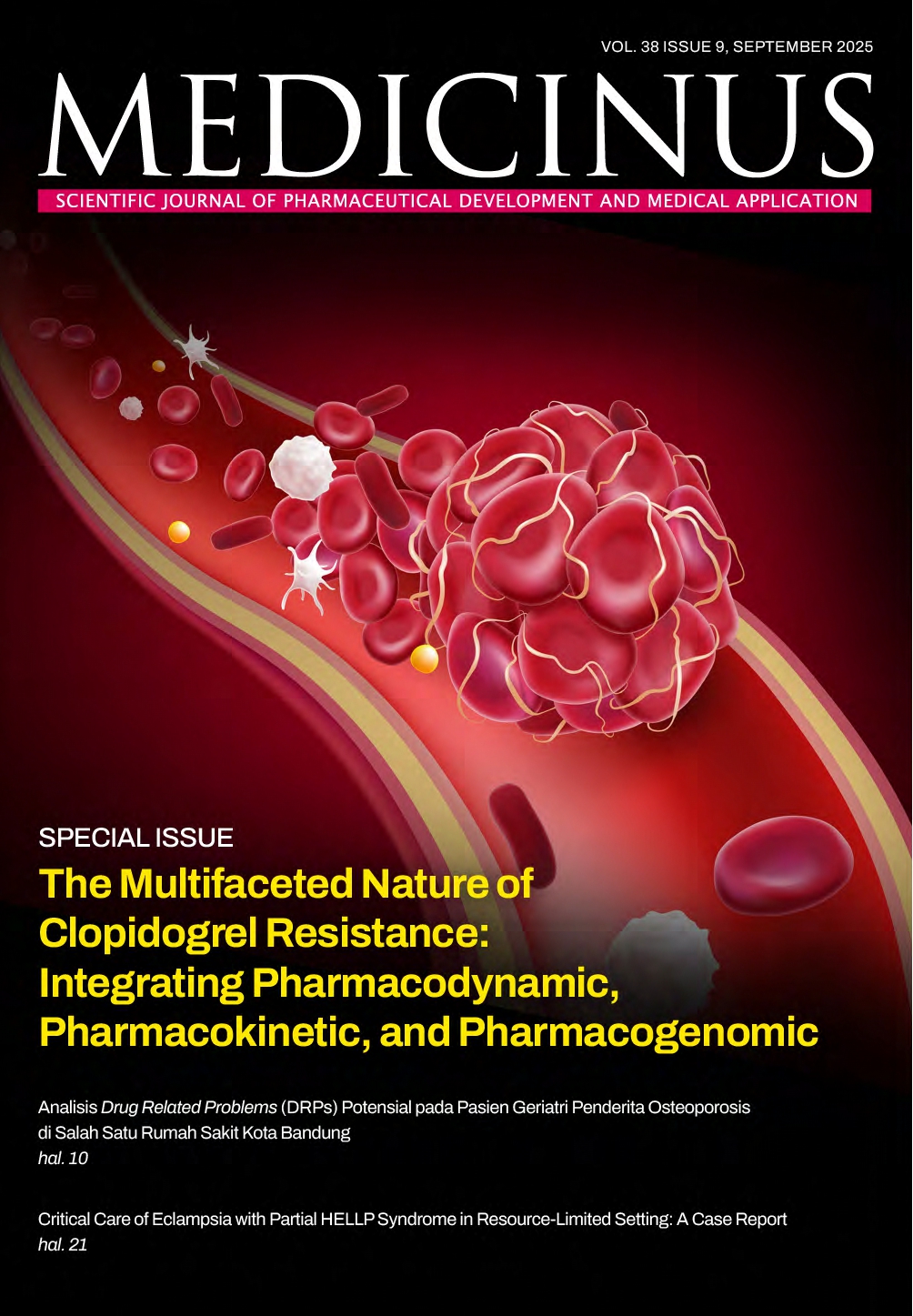Farmakogenomik dalam Pengobatan Presisi: Tinjauan dengan Studi Kasus Clopidogrel dan Tren Masa Depan
DOI:
https://doi.org/10.56951/fqx9vg55Editorial
Farmakogenomik telah menjadi pilar utama dalam pengembangan pengobatan presisi dan bertujuan untuk menyesuaikan terapi obat berdasarkan profil genetik individu. Dengan mengidentifikasi variasi genetik yang memengaruhi metabolisme, efektivitas, dan keamanan obat, farmakogenomik membuka jalan bagi peningkatan hasil terapi dan pengurangan efek samping yang merugikan. Salah satu contoh paling signifikan dalam praktik klinis adalah clopidogrel, antiplatelet yang aktivasi biofarmakologinya bergantung pada enzim CYP2C19. Variasi genetik pada CYP2C19 secara nyata memengaruhi efektivitas klinis clopidogrel dan risiko kejadian kardiovaskular mayor. Artikel ini memaparkan perkembangan terkini dalam implementasi farmakogenomik, dengan fokus pada studi kasus clopidogrel, serta mengeksplorasi berbagai interaksi gen-obat lainnya seperti codeine/CYP2D6, warfarin/VKORC1, dan statin/SLCO1B1. Tinjauan ini juga memetakan tren masa depan farmakogenomik, termasuk integrasi multiomik, genotipisasi preemptif, pemodelan prediktif berbasis kecerdasan buatan, serta potensi intervensi berbasis editing genetik seperti clustered regularly interspaced short palindromic repeats (CRISPR). Terlepas dari kemajuan yang signifikan, tantangan implementatif masih hadir, mulai dari aspek biaya dan infrastruktur kesehatan hingga dilema etika dan regulasi. Tinjauan ini bertujuan untuk memberikan fondasi konseptual dan praktikal bagi pengembangan farmakoterapi yang benar-benar personal di masa depan.
Unduhan
Referensi
1. Anghel SA, Dinu-Pirvu CE, Costache MA, Voiculescu AM, Ghica MV, Anuța V, et al. Receptor pharmacogenomics: deciphering genetic influence on drug response. Int J Mol Sci. 2024;25(17):9371. doi: 10.3390/ijms25179371.
2. Aoullay Z, Smith A, Slaoui M, El Bouchikhi I, Ghazal H, Al Idrissi N, et al. Predictive value of ABCC2 and UGT1A1 polymorphisms on irinotecan-related toxicities in patients with cancer. Genet Test Mol Biomarkers. 2023;27(5):133–41. doi: 10.1089/gtmb.2022.0109.
3. Arlett P, Kjær J, Broich K, Cooke E. Real-world evidence in EU medicines regulation: enabling use and establishing value. Clin Pharmacol Ther. 2022;111(1):21–3. doi: 10.1002/cpt.2479.
4. Crews KR, Monte AA, Huddart R, Caudle KE, Kharasch ED, Gaedigk A, et al. Clinical pharmacogenetics implementation consortium guideline for CYP2D6, OPRM1, and COMT genotypes and select opioid therapy. Clin Pharmacol Ther. 2021;110(4):888–96. doi: 10.1002/cpt.2149.
5. Delabays B, Trajanoska K, Walonoski J, Mooser V. Cardiovascular pharmacogenetics: from discovery of genetic association to clinical adoption of derived test. Pharmacol Rev. 2024;76(5):791–827. doi: 10.1124/pharmrev.123.000750.
6. Ford NF, Taubert D. Clopidogrel, CYP2C19, and a black box. J Clin Pharmacol. 2013;53(3):241–8. doi: 10.1002/jcph.17.
7. Hardcastle F, Lyle K, Horton R, Samuel G, Weller S, Ballard L, et al. The ethical challenges of diversifying genomic data: a qualitative evidence synthesis. Camb Prisms Precis Med. 2023;2:e1. doi: 10.1017/pcm.2023.20.
8. Hegde M, Nebel JC, Rahman F. Language modelling techniques for analysing the impact of human genetic variation. arXiv. 2025. doi: 10.48550/arXiv.2503.10655.
9. Hulshof EC, de With M, de Man FM, Creemers G, Deiman BALM, Swen JJ, et al. UGT1A1 genotypeguided dosing of irinotecan: a prospective safety and cost analysis in poor metaboliser patients. Eur J Cancer. 2022;162:148–57. doi: 10.1016/j.ejca.2021.12.009.
10. Lee CR, Luzum JA, Sangkuhl K, Gammal RS, Sabatine MS, Stein CM, et al. Clinical pharmacogenetics implementation consortium guideline for CYP2C19 genotype and clopidogrel therapy: 2022 update. Clin Pharmacol Ther. 2022;112(5):959–67. doi: 10.1002/cpt.2526.
11. Lopez J, Mark J, Duarte GJ, Shaban M, Sosa F, Mishra R, et al. Role of genetic polymorphisms in clopidogrel response variability: a systematic review. Open Heart 2023;10(2):e002436. doi: 10.1136/openhrt-2023-002436.
12. Maas DPMSM, Willems LH, Kranendonk J, Kramers C, Warlé MC. Impact of CYP2C19 genotype status on clinical outcomes in patients with symptomatic coronary artery disease, stroke, and peripheral arterial disease: a systematic review and meta-analysis. Drugs 2024;84(10):1275–97. doi: 10.1007/s40265-024-02076-7.
13. Miao Q, Yan L, Zhou Y, Li Y, Zou Y, Wang L, et al. Association of genetic variants in TPMT, ITPA, and NUDT15 with azathioprine-induced myelosuppression in southwest China patients with autoimmune hepatitis. Sci Rep. 2021;11(1):7984. doi: 10.1038/s41598-021-87095-0.
14. Morris SA, Nguyen DG, Morris V, Mroz K, Kwange SO, Patel JN. Integrating pharmacogenomic results in the electronic health record to facilitate precision medicine at a large multisite health system. J Am Coll Clin Pharm. 2024;7(8):845–57. doi.org/10.1002/jac5.1996.
15. Patel TJ, Wehbe E, Hughes S, Patanwala AE, Kritharides L, Lal S, et al. Implementing CYP2C19-guided clopidogrel therapy: a scoping review of pharmacogenomic testing services. Pharmacogenomics J. 2025;25(3):12. doi: 10.1038/s41397-025-00371-4.
16. Pratt VM, Cavallari LH, Fulmer ML, Gaedigk A, Hachad H, Ji Y, et al. TPMT and NUDT15 genotyping recommendations: a joint consensus recommendation. J Mol Diagn. 2022;24(10):1051–63. doi: 10.1016/j.jmoldx.2022.06.007.
17. Relling MV, Evans WE. Pharmacogenomics in the clinic. Nature 2015;526(7573):343–50. doi: 10.1038/nature15817.
18. U.S. Food and Drug Administration. FDA drug safety communication: FDA restricts use of prescription codeine pain and cough medicines and tramadol pain medicines in children; recommends against use in breastfeeding women. FDA. 2023. Available at https://www.fda.gov/drugs/drug-safety-and-availability/fda-drug-safety-communication-fda-restricts-use-prescription-codeine-pain-and-cough-medicines-and accessed Aug 7th, 2025.
19. Silva LT, Modesto ACF, Amaral RG, Lopes FM. Hospitalizations and deaths related to adverse drug events worldwide: systematic review of studies with national coverage. Eur J Clin Pharmacol. 2022;78(3):435-66. doi: 10.1007/s00228-021-03238-2.
20. Srivastav AK, Mishra MK, Lillard Jr JW, Singh R. Transforming pharmacogenomics and CRISPR gene editing with the power of artificial intelligence for precision medicine. Pharmaceutics 2025;17(5):555. doi: 10.3390/pharmaceutics17050555.
21. The SEARCH Collaborative Group. SLCO1B1 variants and statin-induced myopathy - a genomewide study. N Engl J Med. 2008;359(8):789–99. doi: 10.1056/NEJMoa0801936.
22. Tunehag KR, Pearce AF, Fox LP, Stouffer GA, Solander S, Lee CR. CYP2C19 genotype-guided antiplatelet therapy and clinical outcomes in patients undergoing a neurointerventional procedure. Clin Transl Sci. 2025;18(1):e70131. doi: 10.1111/cts.70131.
23. Zhou Y, Peng S, Wang H, Cai X, Wang Q. Review of personalized medicine and pharmacogenomics of anti-cancer compounds and natural products. Genes (Basel) 2024;15(4):468. doi: 10.3390/genes15040468.
Unduhan
Terbitan
Bagian
Diterbitkan
Unduhan
Lisensi
Hak Cipta (c) 2025 Raymond R. Tjandrawinata

Artikel ini berlisensi Creative Commons Attribution-NonCommercial 4.0 International License.




